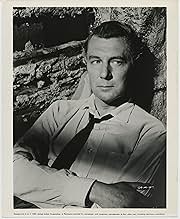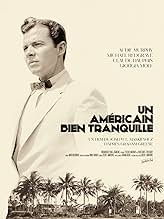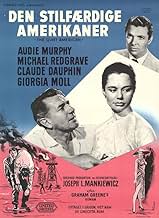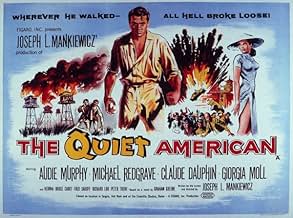IMDb RATING
6.6/10
2.3K
YOUR RATING
A young naive American and a cynical older British diplomat disagree over politics in 1952 Vietnam and over a beautiful young native girl.A young naive American and a cynical older British diplomat disagree over politics in 1952 Vietnam and over a beautiful young native girl.A young naive American and a cynical older British diplomat disagree over politics in 1952 Vietnam and over a beautiful young native girl.
- Director
- Writers
- Stars
- Awards
- 1 nomination total
Georges Bréhat
- French Colonel
- (as Georges Brehat)
Vo Doan Chau
- Cao-Dai Commandant
- (uncredited)
Le Van Le
- Cao-Dai Pope's Deputy
- (uncredited)
Cho Cha Lung
- Hotel Waiter
- (uncredited)
- Director
- Writers
- All cast & crew
- Production, box office & more at IMDbPro
Featured reviews
I loved the Graham Greene novel. I admit I picked it up secretly from my father's library when I was 15. It stayed with me. I knew about the existence of this 1958 version written and directed by Joseph L Mankiewicz but I had never seen it until now, thank you TCM. I had seen the 2002 with a terrific Michael Caine but the film - a more faithful version of Greene's novel according to the critics and it may be true but the 2002 version left me pleased but unmoved while the 1958 version is much more unsettling, in spite of some hard to understand choices by the filmmakers. Audie Murphy plays the quiet American, and he is, very quiet. Good looking a real life American war hero but he is not an actor and here he is sharing the frame with Michael Redgrave. Michael Redgrave! The other oddity is the casting of Italian Actress Giorgia Moll as the Vietnamese girl-in-the-middle. She's lovely but I repeat, she's Italian. No, the power force here is Michael Redgrave, A marvelous, fearless performance and that alone makes The Quiet American an absolute must.
10yostwl
Graham Greene did not have a comfortable vision of the world--or at least of the activities of human beings in the world. While very few movies do justice to books on which they are based, the Quiet American is a chilling forewarning of what the United States would be letting itself in for in the years to come. Murphy, always an appealing figure on the screen but not noted for truly great acting depth and breadth, is ideal for this understated role. A very well done thriller which addresses racism, colonialism, various "economic"isms, all the while focusing on the individual human impacts of high level decision-making. Are we just pawns, forced into just following orders, or do we have the responsibility to take action on the side of what we know to be right, in spite of the personal cost?
The Quiet American has a lot to live up to, because it is adapted from possibly the best book that Graham Greene ever wrote. However, it is a very well made and literate film which manages to make a reasonable stab at living up to the forbidding reputation of its source material.
Audie Murphy gives a career-best performance as the title character, an American living in Vietnam during the French incursion into the country. He believes that he can make a difference by providing funding for arms, but his political and economic beliefs often lead to death and destruction. A British journalist named Fowler (Michael Redgrave) befriends him, but soon their friendship is damaged when the young American has an affair with Fowler's Vietnamese mistress. In the end, Fowler ponders whether to betray the American to his enemies as an act of revenge for what the American has done to his love-life.
The film is powerful, absorbing and well-acted. It perhaps could be criticised for the extraordinarily high amount of dialogue (it's one of those films where if you stop listening for 30 seconds, you'll lose the plot) but that is probably the only true weakness. The themes of betrayal, colonialism, and the wisdom of interfering in the affairs of other nations, are handled thought-provokingly, and the moral dilemma facing the characters at the end are emotionally shattering. Redgrave gives a great performance, conveying the pain of his dilemma with aching conviction.
Audie Murphy gives a career-best performance as the title character, an American living in Vietnam during the French incursion into the country. He believes that he can make a difference by providing funding for arms, but his political and economic beliefs often lead to death and destruction. A British journalist named Fowler (Michael Redgrave) befriends him, but soon their friendship is damaged when the young American has an affair with Fowler's Vietnamese mistress. In the end, Fowler ponders whether to betray the American to his enemies as an act of revenge for what the American has done to his love-life.
The film is powerful, absorbing and well-acted. It perhaps could be criticised for the extraordinarily high amount of dialogue (it's one of those films where if you stop listening for 30 seconds, you'll lose the plot) but that is probably the only true weakness. The themes of betrayal, colonialism, and the wisdom of interfering in the affairs of other nations, are handled thought-provokingly, and the moral dilemma facing the characters at the end are emotionally shattering. Redgrave gives a great performance, conveying the pain of his dilemma with aching conviction.
The Quiet American (1958)
I think this is an extraordinary film. At the time, Americans didn't like it because it made them look bad, and the writer of the book it is based on, Graham Greene, didn't like it because it changed too much of his anti-American plot. But as a film, whatever its blurring of truth to history, is true about human nature. The credit for this goes not only to Greene, the enormously gifted writer and co-screenwriter, but also to the director, one of the lesser known American masters at telling a romantic story, Joseph L. Mankiewicz, who also helped with the screenplay.
The two are a perfect match, really, because both are all about subtlety and observation. Greene in particular has a way of bringing up the biggest issues in the most intimate and delicate ways, never grandiose, always psychologically sharp. And that is carried forward here in Vietnam a decade before the American War of the 1960s. The Communists are already fighting in the north, the French are getting ready to abandon the country to the Americans, and a British reporter is the center of our attention, not quite on anyone's side.
There are two key characters, the reporter played with astonishing depth and acumen by Michael Redgrave, and "the American", played toward a caricature by Audie Murphy, with enough twists to his character to avoid over-stereotyping.
Greene's observations of American do-good naiveté are fascinating, and the way this gets mixed (poisoned) with American meddling and military subversion is way ahead of its time. Or is it? It might be simply observant of the facts in 1950s Vietnam. Greene was a reporter himself there then, and after this book was published he was followed by American Intelligence until his death in 1991. One of the brilliant aspects of this movie is how it is not simply a love story, but has a trenchant, disturbing comment to make about world affairs, from the inside.
Still, love intrudes, and the crossed loves of the two men for the same young Vietnamese woman is less clichéd than you might expect. The story is moving without being sentimental. And all of this is layered up with the actual Imperialist/Colonialist facts of the time. The conflicting sides of a war that few really understood (it seems) until twenty years later are here in their full formed germinations. Unlike the Michael Caine version of the same story (from 2002), this one was made before history had unfolded. It's endlessly almost chillingly fascinating, even though Greene's anti-war (and somewhat anti-American) tone was largely removed. The later movie might be closer to the book, but it feels like a movie made about history, not one that predicts it.
There are some scenes here, priceless ones, shot in Vietnam in 1958, the rest is done (with terrific light and set design) in an Italian film studio. Greene was British and the production Italian, but Mankiewicz was American, and fully steeped in American filmmaking and myth making. It's this last aspect that is key--the movie is made to the highest standards of 1940s American melodramas, even having an echo (in terms of light and drama and style) of William Wyler's "The Letter" also set in Southeast Asia. The filming is astonishing--the photography is in the hands of Robert Krasker, who shot "The Third Man" and "Brief Encounter" to give you an idea of the moody richness of his style.
And as a melodrama it comes down to the crumbling personal world of Fowler. At the end, in the busy night streets of a chaotic Saigon, he says, "I wish there was someone to whom I could say I'm sorry." I found it the final moving, beautiful strain of truth and pathos in a very special movie.
I think this is an extraordinary film. At the time, Americans didn't like it because it made them look bad, and the writer of the book it is based on, Graham Greene, didn't like it because it changed too much of his anti-American plot. But as a film, whatever its blurring of truth to history, is true about human nature. The credit for this goes not only to Greene, the enormously gifted writer and co-screenwriter, but also to the director, one of the lesser known American masters at telling a romantic story, Joseph L. Mankiewicz, who also helped with the screenplay.
The two are a perfect match, really, because both are all about subtlety and observation. Greene in particular has a way of bringing up the biggest issues in the most intimate and delicate ways, never grandiose, always psychologically sharp. And that is carried forward here in Vietnam a decade before the American War of the 1960s. The Communists are already fighting in the north, the French are getting ready to abandon the country to the Americans, and a British reporter is the center of our attention, not quite on anyone's side.
There are two key characters, the reporter played with astonishing depth and acumen by Michael Redgrave, and "the American", played toward a caricature by Audie Murphy, with enough twists to his character to avoid over-stereotyping.
Greene's observations of American do-good naiveté are fascinating, and the way this gets mixed (poisoned) with American meddling and military subversion is way ahead of its time. Or is it? It might be simply observant of the facts in 1950s Vietnam. Greene was a reporter himself there then, and after this book was published he was followed by American Intelligence until his death in 1991. One of the brilliant aspects of this movie is how it is not simply a love story, but has a trenchant, disturbing comment to make about world affairs, from the inside.
Still, love intrudes, and the crossed loves of the two men for the same young Vietnamese woman is less clichéd than you might expect. The story is moving without being sentimental. And all of this is layered up with the actual Imperialist/Colonialist facts of the time. The conflicting sides of a war that few really understood (it seems) until twenty years later are here in their full formed germinations. Unlike the Michael Caine version of the same story (from 2002), this one was made before history had unfolded. It's endlessly almost chillingly fascinating, even though Greene's anti-war (and somewhat anti-American) tone was largely removed. The later movie might be closer to the book, but it feels like a movie made about history, not one that predicts it.
There are some scenes here, priceless ones, shot in Vietnam in 1958, the rest is done (with terrific light and set design) in an Italian film studio. Greene was British and the production Italian, but Mankiewicz was American, and fully steeped in American filmmaking and myth making. It's this last aspect that is key--the movie is made to the highest standards of 1940s American melodramas, even having an echo (in terms of light and drama and style) of William Wyler's "The Letter" also set in Southeast Asia. The filming is astonishing--the photography is in the hands of Robert Krasker, who shot "The Third Man" and "Brief Encounter" to give you an idea of the moody richness of his style.
And as a melodrama it comes down to the crumbling personal world of Fowler. At the end, in the busy night streets of a chaotic Saigon, he says, "I wish there was someone to whom I could say I'm sorry." I found it the final moving, beautiful strain of truth and pathos in a very special movie.
It's 1952 Vietnam. The French are helping the locals fight the communist insurgents. They find the dead body of Alden Pyle (Audie Murphy). Thomas Fowler (Michael Redgrave) sees it but doesn't tell young Vietnamese girl Phuong (Giorgia Moll) who is desperately waiting for Alden. Inspector Vigot (Claude Dauphin) questions Fowler who tells him that Pyle was a quiet American. There was a love triangle between Phuong, world-weary Brit Fowler and wide-eyed do-gooder Pyle from a private aid organization. The movie is told in flashback as Pyle and Fowler meet a few months before. Pyle is importing plastics to replace production in China. Pyle wants to marry Phuong making Fowler jealous.
There is no excuse for changing the Graham Greene novel 180 degrees. They should have the decency to change the title although it's understandable in the Hollywood red scare era. Also it's still a time when white people play Hollywood lead ethnic characters. On the other hand, there are some good qualities. Redgrave is doing solid work. He gets that perfect cynicism. It also has some scenes in Vietnam which is very rare at the time. This has some of the murky morality but it turns that murkiness on its head. This has some good stuff but it is not Graham Greene's book.
There is no excuse for changing the Graham Greene novel 180 degrees. They should have the decency to change the title although it's understandable in the Hollywood red scare era. Also it's still a time when white people play Hollywood lead ethnic characters. On the other hand, there are some good qualities. Redgrave is doing solid work. He gets that perfect cynicism. It also has some scenes in Vietnam which is very rare at the time. This has some of the murky morality but it turns that murkiness on its head. This has some good stuff but it is not Graham Greene's book.
Did you know
- TriviaThe first Hollywood movie made in Vietnam.
- GoofsRight before the explosion at The Continental, Fowler was limping with a cane. When he hears the explosion, he leaves his cane and runs smoothly down the street.
- Quotes
Inspector Vigot: You know that it is a mistake to say that communism is appealing to the mentally advanced. I think it is only true when the mentally advanced are also emotionally retarded.
- ConnectionsFeatured in Dangerous Edge: A Life of Graham Greene (2013)
- How long is The Quiet American?Powered by Alexa
Details
- Release date
- Country of origin
- Languages
- Also known as
- El americano tranquilo
- Filming locations
- Saigon, Vietnam(city exteriors / relgious ceremonies / outdoor market)
- Production company
- See more company credits at IMDbPro
- Runtime2 hours 2 minutes
- Color
- Aspect ratio
- 1.85 : 1
Contribute to this page
Suggest an edit or add missing content































